Tragic Consequences of U.S. Airstrikes: The Case of Chad Joseph
The recent U.S. airstrikes in the Caribbean have ignited a firestorm of anger and demands for accountability from the families of those affected. Among the casualties is 26-year-old Chad Joseph, who was killed alongside another Trinidadian man, Rishi Samaroo, in a military operation targeting suspected drug trafficking vessels. As relatives mourn their losses, they seek answers, raising questions about the justification and consequences of U.S. military actions abroad.
The Incident and Its Aftermath
On October 14, family members of Chad Joseph publicly expressed their grief and outrage over his death, asserting that he was simply a victim of circumstance. Reports indicate that Chad and Rishi were among six individuals killed in a strike aimed at a boat allegedly trafficking narcotics from Venezuela. This incident highlights the devastating impact of military operations on civilian lives, particularly in regions often ensnared in geopolitical tensions.
Grief Turned to Outrage
Chad’s cousin, Afisha Clement, did not hold back in her condemnation of the situation. She articulated a heartfelt plea for justice, emphasizing the deep void left by Chad’s death. “Donald Trump took a father, a brother, an uncle, a nephew from families. He don’t care what he is doing,” she declared, revealing the anguish and anger felt throughout the community. The sentiment reflects a belief that governmental actions often overshadow the lives and rights of individuals, particularly in marginalized communities.
Questions of Evidence and Accountability
The airstrike has raised significant questions regarding the accuracy and legality of the U.S. operation. Chad’s family and other community members are demanding clear evidence of drug trafficking activities. They ask, “If you say a boat has narcotics on it, where is the narcotics? We want proof.” This plea underscores a broader concern about due process and the rights of those affected by military intervention, as families grapple with the unpredictable and often violent consequences of seemingly indiscriminate strikes.
The Broader Context of U.S. Military Operations
This incident is part of a series of military operations undertaken by the Trump administration, aimed at dismantling so-called “narcoterrorist” networks. Despite the assertion that these operations are crucial for combating drug smuggling, they have resulted in significant civilian casualties without the presentation of substantial evidence against the individuals targeted. With rising tensions and backlash from Caribbean nations, critics argue that the U.S. is overstepping its jurisdiction and disregarding the sovereignty of nations like Trinidad and Tobago.
The Impact on Local Communities
Chad’s relatives allege that he was not involved in drug trafficking but rather moved to Venezuela to support his family through fishing. This tragedy serves as a stark reminder of the complexities facing ordinary people caught in the crossfire of international politics. Neighbors remember Chad as a dedicated father, a loving son, and a hardworking fisherman—an image that starkly contrasts the narrative propagated by officials labeling him a “narcoterrorist.”
A Lack of Due Process
At a wake held for Chad and Rishi, frustrations boiled over as family members voiced their discontent with both the U.S. military actions and Trinidad and Tobago’s government. Accusations of a compromise in national sovereignty were prevalent, as locals lamented the loss of control over their waters and the governance of their sky. La Toya, Chad’s cousin, articulated a crucial point: “Everybody have a right to due process,” a right they felt was blatantly overlooked in this case.
A Community in Mourning
In the wake of this tragedy, the community has come together to express their sorrow and indignation. Efforts to remember Chad as more than just a casualty of military aggression have become increasingly important. Relatives recount stories of a man dedicated to providing for his family, reinforcing the notion that ordinary lives are often upended by grand geopolitical maneuvers.
A Call for Action and Awareness
As grief continues to manifest in various forms, those affected by Chad’s death and similar incidents are urging for increased awareness and accountability. The dire need for clear communication, proper evidence, and respect for human life stands at the forefront of discussions surrounding military interventions. The demands for justice echo not only in Trinidad and Tobago but also resonate globally, reflecting a broader call for ethical considerations in foreign policy decisions.



